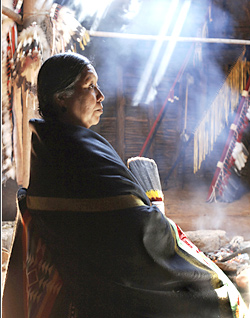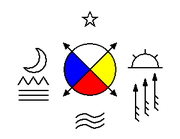The Apache are several Southern Athabaskan language–speaking peoples of the Southwest and the Southern Plains. They are linguistically related to the Navajo. They migrated from the Athabascan homelands in the north into the Southwest between 1000 and 1500 CE.
Lipan Apache are a band of Apache, a Southern Athabaskan Indigenous people, who have lived in the Southwest and Southern Plains for centuries. At the time of European and African contact, they lived in New Mexico, Colorado, Oklahoma, Texas, and northern Mexico. Historically, they were the easternmost band of Apache. Early adopters of horse culture and peyotism, the Lipan Apache hunted bison and farmed.

Mescalero or Mescalero Apache is an Apache tribe of Southern Athabaskan–speaking Native Americans. The tribe is federally recognized as the Mescalero Apache Tribe of the Mescalero Apache Reservation, located in south-central New Mexico.

Jicarilla Apache, one of several loosely organized autonomous bands of the Eastern Apache, refers to the members of the Jicarilla Apache Nation currently living in New Mexico and speaking a Southern Athabaskan language. The term jicarilla comes from Mexican Spanish meaning "little basket", referring to the small sealed baskets they used as drinking vessels. To neighboring Apache bands, such as the Mescalero and Lipan, they were known as Kinya-Inde.

The Plains Apache are a small Southern Athabaskan group who live on the Southern Plains of North America, in close association with the linguistically unrelated Kiowa Tribe. Today, they are centered in Southwestern Oklahoma and Northern Texas and are federally recognized as the Apache Tribe of Oklahoma.
State-recognized tribes in the United States are organizations that identify as Native American tribes or heritage groups that do not meet the criteria for federally recognized Indian tribes but have been recognized by a process established under assorted state government laws for varying purposes or by governor's executive orders. State recognition does not dictate whether or not they are recognized as Native American tribes by continually existing tribal nations.
The Fort Sill Apache Tribe of Oklahoma is the federally recognized Native American tribe of Chiricahua Warm Springs Apache in Oklahoma.
Teyas were a Native American people living near what is now Lubbock, Texas, who first made contact with Europeans was the 1541 Francisco Vásquez de Coronado Expedition.
Jumanos were a tribe or several tribes, who inhabited a large area of western Texas, New Mexico, and northern Mexico, especially near the Junta de los Rios region with its large settled Indigenous population. They lived in the Big Bend area in the mountain and basin region. Spanish explorers first recorded encounters with the Jumano in 1581. Later expeditions noted them in a broad area of the Southwest and the Southern Plains.
The following outline is provided as an overview of and topical guide to United States federal Indian law and policy:
The Lipan Apache Tribe of Texas is a cultural heritage organization of individuals who identify as descendants of Lipan Apache people, based in McAllen, Texas.
The Choctaw-Apache Community of Ebarb, also known as the Choctaw-Apache Tribe of Ebarb, is a state-recognized tribe and nonprofit organization in Louisiana. The community describes themselves as the descendants of Choctaw and Lipan Apache people and is primarily based in the town of Zwolle, Louisiana, with powwow grounds in Ebarb, Louisiana, both of which are in Sabine Parish, Louisiana, where the group say they have lived since the early 18th century.

The Texas Band of Yaqui Indians is a cultural heritage organization for individuals who identify as descendants of Yaqui people, and are dedicated to cultural and ethnic awareness of the Yaqui. The organization is headquartered in Lubbock, Texas. The Texas Band of Yaqui Indians is an unrecognized organization. They are neither a federally recognized tribe nor a state-recognized tribe.
Carnoviste was a southern (Guadalupe) Mescalero chief, his band—presumably Tsehitcihéndé or Niit'ahénde—lived in the Texan Big Bend Country, ranging on both sides of the Rio Grande from the Guadalupe Mountains towards east of the Limpia Mountains onto the edge of the Southern Plains.

Native American tribes in Texas are the Native American tribes who are currently based in Texas and the Indigenous peoples of the Americas who historically lived in Texas.
The Intertribal Buffalo Council (ITBC), also known as the Intertribal Bison Cooperative, is a collection of 82 federally recognized tribes from 20 different states whose mission is to restore buffalo to Indian Country in order to preserve the historical, cultural, traditional, and spiritual relationships for future Native American generations.





